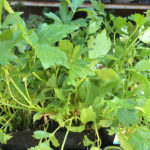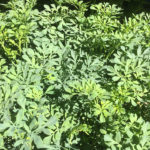Ancient Roman recipes provide a fun and easy way to understand the ancient Roman world, through food and through the Latin names for ingredients. We are fortunate that some ancient Roman books about agriculture and culinary arts have survived over the centuries. Here are three simple recipes, one from Cato the Elder (234 BCE – 149 BCE) and two from Apicius (whose identity is uncertain but the book is 4th or 5th century CE).
Making these recipes is a hands-on way of learning, about Roman cooking and also about the Latin names of the mostly familiar ingredients.
Some of the ingredients mentioned in Roman recipes are not available today. For example, silphium is extinct but we substitute garlic juice where it would be used. We do have recipes for making Roman fermented fish sauce, which they called liquamen or garum, but the process is not easy. Since it is similar in flavor and use to fish sauce in contemporary Asian cuisine, the product we can buy in Asian markets is a fine substitute. We also do not use the herbs rue (rutam) or lovage (levisticum or ligusticum) very often but we can buy the plants in any well-stocked nursery.
A Roman recipe from “De Agricoltura” by Cato the Elder:
Recipe for an appetizer of Chopped Olives (n. 119)
Epityrum* album nigrum variumque sic facito. Ex oleis albis nigris variisque nuculeos eicito. Sic condito. Concidito ipsas, addito oleum, acetum, coriandrum, cuminum, feniculum, rutam, mentam. In orculam condito, oleum supra siet. Ita utito.
To make Epityrum* of young (i.e. green), black and variously-colored olives. Remove the pits from green, black and variously-colored olives. Prepare them this way. Chop them and garnish them by adding olive oil, vinegar, coriander, cumin, fennel, rue and mint. Put it all in a small jar, cover with olive oil and serve them.
* The name Epityrum comes from Greek and means “over cheese” since the Romans would eat this olive garnish with cheese and bread.
Two Roman Recipes from “De Re Coquinaria” by Apicius
Recipe for Mashed Squash (n. 79)
Cucurbitas frictas tritas: Piper, ligusticum, cuminium, origanum, cepam, vinum, liquamen et oleum. Amulo obglabis in patina et inferes.
Squash, fried and mashed: Pepper, lovage, cumin, oregano, onion, wine, fish sauce and olive oil. Thicken it with starch in the pot and serve.
Recipe for Boiled Leek Salad (n. 93)
Porros maturi fieri: Pugnum salis, aquam et oleum mixtum facies et ibi coques et eximes. Cum oleo, liquamine, mero et inferes.
For large, mature leeks: Put a handful of salt into water mixed with olive oil, cook the leeks in this, then remove them. Add olive oil, fish sauce, plain wine and serve them.


